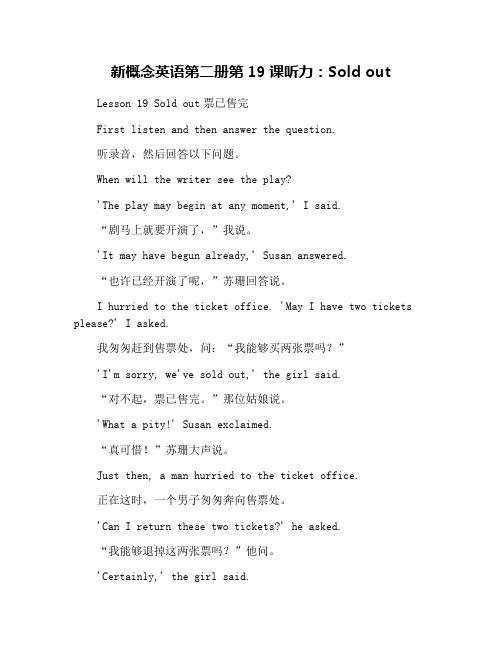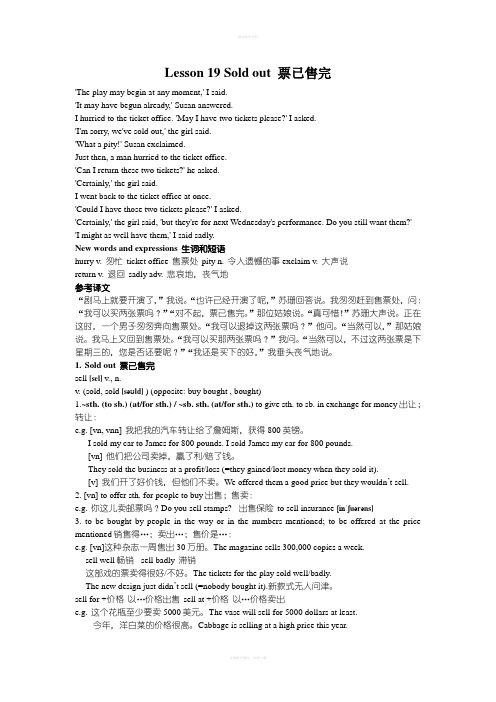新概念英语第二册第十九课课后习题答案
- 格式:doc
- 大小:14.50 KB
- 文档页数:3

新概念英语第二册第19课Lesson 19 Sold out 票已售完'The play may begin at any moment,' I said.'It may have begun already,' Susan answered.I hurried to the ticket office. 'May I have two tickets please?' I asked.'I'm sorry, we've sold out,' the girl said.'What a pity!' Susan exclaimed.Just then, a man hurried to the ticket office.'Can I return these two tickets?' he asked.'Certainly,' the girl said.I went back to the ticket office at once.'Could I have those two tickets please?' I asked. 'Certainly,' the girl said, 'but they're for next Wednesday's performance. Do you still want them?''I might as well have them,' I said sadly.New words and expressions 生词和短语hurry v. 匆忙ticket office 售票处pity n. 令人遗憾的事exclaim v. 大声说return v. 退回sadly adv. 悲哀地,丧气地参考译文“剧马上就要开演了,”我说。

New Concept English BookⅡ一、单项选择1. the teacher at this college last year ? Yes, he did.A. Did, taughtB. does, teachC. Did, teach D Do,teach2、I went to the supermarket and bought a great manyA.tomatoesB.potatosC.vegetablesD.meat3、He until it stopped raining.A.waitedB. didn't waitC. didn’t leaveD.left4、For the whole period of two months, there no rain in this area.A.isB.will beC.has beenD.have been5、——Hey, how are you getting with your girlfriend?——A .It’s none of your business! B.Dear me!C .Take it easy. D.Enjoy yourself.6、A great number of students fond of films, but a good student seldom to the cinemaA. are,goesB. is,goesC. are,goD. is,go7、If their house not like ours, what it look like?A.is, isB.is, doesC.does, doesD.does, is8. I’m _______ in that ________ filmA. interesting, interestedB. interested, interestingC. interested, interestedD. interesting, interesting9. ------ Hurry up! We have little time!------ I ____________.A. will comeB. comeC. shall comeD. am coming10. -------_____________?-------I am Italian.A.What’s your jobB. What’s your nameC. What nationality are youD.Where do you from11. I don’t have ______writing paper, I only have _____chalk s.A. any, anyB. any, someC. some, someD.some,any12. Look, the little dog ______after a big cat!A. runsB. is runningC. is going to runD.is runing13. It’s very cold. _______ your coat.A. Take offB. Put onC. Turn onD.Put off14.The man could not bear it.He could not it.A.carryB.sufferC.standD.lift15.Just then,the telephone rang.It rang .A.at onceB.immediatelyC.againD.at that moment16.On the last day he made a big dicision.It was the day of his holiday.A.finalB.endtestD.bottom17.He calls at every house in the street.He everyone.A.shouts atB.callsC.cries out atD.visits18.The detectives were a valuable parcel of diamonds.A.expectingB.waitingC.expecting forD.expecting to19.The man is fond of gardens. .A.They like himB.They like to himC.He likes themD.He likes they20.How many times did the clock .A.hitB.beatC.knockD.strike二、Change the sentences with what or what a(n)21. It was very hot yesterday.What a hot day it was yesterday!22. It is so coldWhat cold weather it is!23. You have such an old bike.What an old bike you have!24. The book Tom is reading is very interesting.What an interesting book Tom is reading!25. We live in a very noisy place.What a noisy place we live in!三、用over, between, along, in front of, behind, 或across 等介词或介词短语填空26. A lot of birds are flying ___over____ the river.27. The teacher is standing _____in front of_______ the blackboard.28. I am running __along_____ the Great Wall(长城).29. They are swimming __across____ the river.30. I am sitting ____between_____my brother and my sister.四、用所给单词的适当形式填空:31、He is not very friendly (friend) towards newcomers(新来的).32、She slammed the telephone down angrily (angry).33、It was a sudden decision (decide)34、She works for that restaurant as a waitress (waiter)35、She is very excited (exciting) about winning the first prize.36、What have you been done lately (late).37、We are very pleased (please) with our new house.38、She rarely ( rare) visited her aunt.39、“W hat do you want?”She asked rudely (rude)40、I had a long conversation (converse) with her the other day(不久前一天).五、词组互译41、none of your business 与你无关42、破坏我的假日spoil my holiday43、在回家的路上on the way back home44、by the way 顺便说一下45、今天就到此为止let’s call it today六、阅读理解How many different languages are spoken in the world today? There are about 5,000 different languages. Nearly 900 languages are spoken in India.Chinese is the language spoken by the biggest number of people in the world.But the most widely spoken language in the world is English.300,000,000 people speak English as a first language.Nearly twice as many--about 650 million people speak it as a foreign language.How many words are there in the English language? There are about 490,000.Also,there are about 300,000 words used in science(科技).There are more words in English than in any other language.But most people use no more than 60,000 words.Children,leaving school at the age of 1 6,know about 1 5,000 words.1.The Chinese language is spoken ________.A.in most countries in the worldB.in 600 countriesC.by the biggest number of people in the world2.About 650 million people speak English as________.A.a first languageB.well as the native speakersC.a second language3.Only ________ English words are used by most people.A.six thousandB.three hundred thousandC.sixty thousand4.Children ________ know about 15,000 words.A.who start school at the age of 6B.who study at schoolC.who finish school at sixteen5.Which of the fol lowing is true’A.There are no more than 5,000 different languages in the world.B.English is the most widely-used language.C.The Indian people speak 800 languages.One day a poor student was walking through a town. He had not had anything to eat for several days and he was very hungry. And when he saw a man selling homemade hamburgers, he let out a scream and fell to the ground. When the surprised seller asked the student what the matter was, the student answered, “I don’t like hamburgers. In fact, I hat e them. Whenever I see them, I feel ill and can’t eat.”The hamburger seller then thought that he would play a joke on the student. He put ten hamburgers in the comer of a room and then locked the student in it. After a short time, the hamburger seller opened the door of the room. He was surprised to find that the student had eaten all the hamburgers. The student explained. “For some strange reason, I suddenly decided that I liked hamburgers.”The hamburger seller was angry that the student had fooled him. He asked what other things he did not like to eat. “Oh, I like everything, ”answered the student, “Except at the moment Iwould hate to drink two cups of good strong tea!”6. The student was very hungry because .A.he was illB.he had not eaten for a long timeC.he saw the hamburgers7. The hamburger seller wanted to the student.A.help B,pull up C.play a joke on8. The hamburger seller was surprised to find the student had eaten hamburgers.A.tenB.fiveC.two9. In fact, .A.the seller wanted to sell some hamburgers to the studentB.the student really hated hamburgersC.the student fooled the hamburger seller10. The student .A.wanted some teaB.didn’t like teaC.hated strong teaGeorge works in a factory. He was born in a very poor family and was in school for only four years. He has to do the hard work, but he is paid less because of this. He likes to watch football matches very much and spends much time on it.One evening there was a big football match on a playground. He borrowed some money from his friend and hurried there. There were a lot of people there. And all the tickets were sold out. He was sorry for it. He saw a pole(电线杆)outside the playground and climbed it up quickly. A policeman came and said. “It’s dangerous to stay on it! Come down!”“Wait a minute, please!” George said and just at that moment the policeman heard cheers in the playground and asked in a hurry. “Which team has kicked a goal?” “Ours!” “Wonder ful!You can stay there. But take care!” the policeman said happily and left. When the match would soon be over, he came back again and asked,“Who’s won?” “Theirs, 3-2.” “Come down, ”the policeman said a ngrily, “Such a match isn’t worth watching!”George had to come down. But soon they heard cheers again. The policeman said in a hurry, “Climb up quickly and see who’s kicked a goal!”11. George is paid less because he didn’t learn much when he was young.A.RightB.WrongC.Doesn’t say12. George climbed up the pole because he hoped to save some money.A.RightB.WrongC.Doesn’t say13. The policeman soon changed his mind at the first time because he thought it was safe for George to be on the pole.A.RightB.WrongC.Doesn’t say14. The policeman became angry when he heard their team had lost the game.A.RightB.WrongC.Doesn’t say15. Both George and the policeman are football fans.A.RightB.WrongC.Doesn’t say七、完型填空Mrs. Williams loved flowers and had a small __1__ beautiful garden.In the summer,her roses were always the __2__ in her street.0ne summer afternoon her __3__ rang,and when she went to the front door,she saw a small boy outside.He was about seven years old.and was holding a big bunch(束)of beautiful roses in his hand.“I __4__ roses, ” he said.“Do you want any? They are quite cheap.One shilling __5__ a big bunch.They are fresh(新鲜).I __6__ them this afternoon.” ’“My boy,” Mrs. Williams answered,“I pick __7__ whenever I want,and don’t pay __8__ for them,because I have lots in my garden.”“Oh,no,you haven’t,”said the small boy.“There __9__ any roses in your garden ----__10__ they are here in my hand!”1.A and B or C but2.A better B worst C best3.A bell B telephone C door4.A sell B sold C am selling5.A for B by C in6.A brought B took C picked7.A flowers B roses C a flower8.A nothing B something C anything9.A haven't B won’t C aren’t10.A so B and C because。

新概念英语第二册第19课听力:Sold out Lesson 19 Sold out票已售完First listen and then answer the question.听录音,然后回答以下问题。
When will the writer see the play?'The play may begin at any moment,' I said.“剧马上就要开演了,”我说。
'It may have begun already,' Susan answered.“也许已经开演了呢,”苏珊回答说。
I hurried to the ticket office. 'May I have two tickets please?' I asked.我匆匆赶到售票处,问:“我能够买两张票吗?”'I'm sorry, we've sold out,' the girl said.“对不起,票已售完。
”那位姑娘说。
'What a pity!' Susan exclaimed.“真可惜!”苏珊大声说。
Just then, a man hurried to the ticket office.正在这时,一个男子匆匆奔向售票处。
'Can I return these two tickets?' he asked.“我能够退掉这两张票吗?”他问。
'Certainly,' the girl said.“当然能够,”那姑娘说。
I went back to the ticket office at once.我马上又回到售票处。
'Could I have those two tickets please?' I asked.“我能够买那两张票吗?”我问。
'Certainly,' the girl said, 'but they're for next Wednesday's performance. Do you still want them?'“当然能够,不过这两张票是下星期三的,您是否还要呢?”'I might as well have them,' I said sadly.“我还是买下的好,”我垂头丧气地说。

Lesson 19 Sold out 票已售完'The play may begin at any moment,' I said.'It may have begun already,' Susan answered.I hurried to the ticket office. 'May I have two tickets please?' I asked.'I'm sorry, we've sold out,' the girl said.'What a pity!' Susan exclaimed.Just then, a man hurried to the ticket office.'Can I return these two tickets?' he asked.'Certainly,' the girl said.I went back to the ticket office at once.'Could I have those two tickets please?' I asked.'Certainly,' the girl said, 'but they're for next Wednesday's performance. Do you still want them?''I might as well have them,' I said sadly.New words and expressions 生词和短语hurry v. 匆忙ticket office 售票处pity n. 令人遗憾的事exclaim v. 大声说return v. 退回sadly adv. 悲哀地,丧气地参考译文“剧马上就要开演了,”我说。

新概念英语第二册课后练习题答案详解(第19课)新概念英语第二册课后习题 Lesson 191. a根据课文第5-6行苏珊和售票处姑娘的对话:‘I’m sorry, we’ve sold out,’ the girl said. ‘What a pity!’ Susan exclaimed, 只有a. they had all been sold 与课文内容相符,而其他3个选择都与课文实际内容不符,所以选a.2. d根据课文最后一行‘I might as well have them,’ I said sadly(我还是买下为好,我垂头丧气地说。
) 只有d. wasn’t too pleased to get tickets for next Wednesday’s performance 最能反映作者当时的心情,而其他3个选择都与课文实际内容不符,所以选d.3. c前一句The play may begin at any moment(剧马上就要开演了)是对将要发生的事情的推测,只有c. hasn’t begun yet (它还没开演呢)是合乎逻辑的,也与前一句的内容相符合。
而其他3个选择 a. has begun(已经开演了)不符合逻辑;b. won’t begin for a longtime(好长一段时间后才开演)与课文意思不符;d. begun a long time ago(很久以前就开演了)更不符合题目意思和时态。
4. c这是一个疑问句,需要用疑问句的语序,即主谓倒置, a. You must give me; b. You have got to give me 与 d. You may giveme 这3个选择都是陈述句语序,只有c. Could I have 是疑问句语序,并且could 同前一句中的may 是一样的,都是表示“请求”的,所以应该选c.动词let 后面只能跟不带to 的动词不定式才合乎语法即let sb. do sth.. a. having 是现在分词,不符合语法; b. to have 中动词不定式不应该带to, 也不合乎语法;c. had 是动词的过去式,也不符合语法; 只有d. have 是不带to 的动词不定式,所以应该选d.6. b这个句子的时间状语 next Wednesday 下星期三,班是表示将来的时间,所以需要用将来时态。

新概念英语第二册(英音新版) 第19课:票已售完 Lesson 19 Sold out第十九课票已售完First listen and then answer the question.听录音,然后回答以下问题。
When will the writer see the play?作者什么时候能够观看演出?‘The play may begin at any moment,’ I said.“剧马上就要开演了,”我说。
‘It may have begun already,' Susan answered.“也许已经开演了呢,”苏珊回答说。
I hurried to the ticket office.我匆匆赶到售票处,May I have two tickets please? I asked.问:“我能够买两张票吗?”I'm sorry, we've sold out, the girl said.“对不起,票已售完。
”那位姑娘说。
What a pity! Susan exclaimed.“真可惜!”苏珊大声说。
Just then, a man hurried to the ticket office.正在这时,一个男子匆匆奔向售票处。
Can I return these two tickets? he asked.“我能够退掉这两张票吗?”他问。
Certainly, the girl said.“当然能够,”那姑娘说。
I went back to the ticket office at once.我马上又回到售票处。
Could I have those two tickets please? I asked.“我能够买那两张票吗?”我问。
‘Certainly,' the girl said,‘but they're for next Wednesday's performance.’“当然能够,不过这两张票是下星期三的。
新概念英语第二册第19课习题答案Lesson 201. b根据课文第4行 I never catch anything---not even old boots, 只有b. never catches anything 与课文实际内容相同,而其他3个选择都与课文内容不符。
2. c根据课文最后一句I am only interested in sitting in a boat and doing nothing at all! 只有c. doing nothing 是准确答案,而其他3个选择都不符合课文内容。
3. b本句是对主语提问的,回答是Fishing. a. who (谁)是对主语提问的; c. whom(谁)是对宾语提问的; d. whose(谁的)确是对定语提问的;只有b. which 是对做主语的事物提问的,所以选b.4. b本句是带never的否定句,只有b. anything 能够用在否定句中。
而a. nothing若用在否定句中,就会使原句变成肯定意义的句子,不符合题目意思;c. something 只能用于肯定句中;d. everything也不能用在否定句中。
5. c前面句子 I am even less lucky 中的 less(不及)是表示否定意义的比较级,只有c. not so 是表示否定意义的,而其他3个选择都没有否定的意思.6. b只有b. an empty bag 最符合语法。
而其他3个选择都有语法错误。
a. a empty bag 中empty 是以元音开头的,前面不能用a 而应该用an; c. empty bag 中 bag 是可数名词,需要用an 来修饰; d. one empty bag 不符合习惯用法,单数可数名词前通常用不定冠词a或an 修饰,除非表示强调才用one 修饰。
所以应该选b.7. c只有c. all 才能使这个句子同前一句I am only interested in doing nothing.的含义相符合,all等于the things that ,能够代替doing nothing. 而其他3个选择中a. only 和d. the only 不符合语法,b. the one 不符合题目意思,不能完全表达清楚。
新概念英语第二册课后习题答案
Lesson 19
1. a 根据课文第5-6行苏珊和售票处姑娘的对话:‘I’m sorry, we’ve sold out,’the girl said. ‘What a pity!’Susan exclaimed, 只有 a. they had all been sold与课文内容相符,而其他3个选择都与课文实际内容不符,所以选a.
2. d根据课文最后一行‘I might as well have them,’I said sadly(我还是买下为好,我垂头丧气地说。
)只有 d. wasn’t too pleased to get tickets for next Wednesday’sperformance 最能反映作者当时的心情,而其他3个选择都与课文实际内容不符,所以选d.
3. c前一句The play may begin at any moment(剧马上就要开演了)是对将要发生的事情的推测,只有 c. hasn’t begun yet (它还没开演呢)是合乎逻辑的,也与前一句的内容相符合。
而其他3个选择 a. hasbegun(已经开演了)不符合逻辑;b. won’t begin for a longtime(好长一段时间后才开演)与课文意思不符;d. begun a long timeago(很久以前就开演了)更不符合题目意思和时态。
4. c 这是一个疑问句,需要用疑问句的语序,即主谓倒置, a. You must give me; b. You have got togive
me 与 d. You may give me 这3个选择都是陈述句语序,只有c. Could I have是疑问句语序,并且could 同前一句中的may 是一样的,都是表示“请求”的,所以应该选c.
5. d 动词let 后面只能跟不带to 的动词不定式才合乎语法即let sb. do sth.. a. having 是现在分词,不符合语法;
b. to have 中动词不定式不应该带to, 也不合乎语法;
c. had 是动词的过去式,也不符合语法;只有
d. have是不带to 的动词不定式,因此应该选d.
6. b 这个句子的时间状语next Wednesday 下星期三,班是表示将来的时间,所以需要用将来时态。
a. was 是过去时,不对。
c. shall be 是将来时,但shall只能用在第一人称,而本句主语是第三人称。
d. has been 是现在完成时,不对。
只有 b. will be 是将来时,符合时态和人称的要求,所以选b. 本句的意思是:演出将在下星期三进行。
7. c 前一句子I might as well have them(我还是把他们买下来吧),表示说话人不情愿或勉强这样做。
a. verypleased(非常高兴), b. very glad(很高兴) 与 d. delighted(极为高兴)都与这个句子的含义相反,只有
c. not very glad 符合题目意思,因此选c.
8. b 只有 b. went there quickly 与前一句中的hurried to (匆匆赶到) 的意思相同。
而 a. wentthere(去那) 意思不准确; c. went there slowly (慢慢走到那儿)
与hurried to …意思相反; d. didn’t go there (没有去那儿)更不符合题目意思。
9. c 只有 c. sorry (遗憾)同前面的what a pity(真可惜) 意思相符合,而其他3个选择都与其含义相反,所以选c.
10. a只有 a. give them back 与前面的returned(还给) 的意思相同,而其他3个选择 b. give them in(交上它们), c. give them up (放弃它们) , d. give them off(发放它们) 都没有“归还”的意思。
11. c只有 c. Of course(当然) 同前一句中的Certainly 是同义词。
而其他3个选择都不正确。
12. c只有 c. now 才能使句子同前面的句子Do you still want them? (你还想要它吗?)的意思吻合.而a. yet,b. even, d. more 都不符合语法和题目意思.。